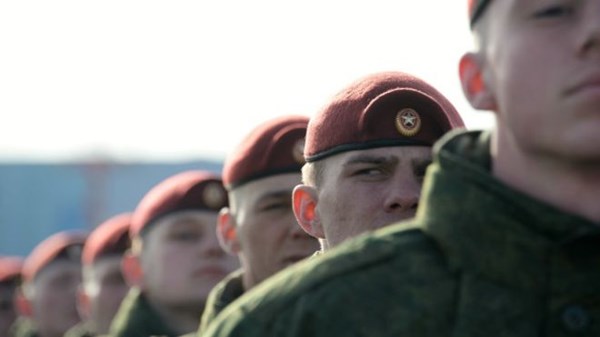Russia's new National Guard will be used in operations abroad
Russia’s new National Guard will now be able to fight outside of Russia. Participation in peacekeeping operations is one of the functions of the new office as stated in the published draft of the presidential decree on the establishment of the Federal Service of the Russian Guard, RBC reported.
The Federal Service of the National Guard Troops of Russia (Rosguard) will participate in the peacekeeping operations and employees` training of law enforcement bodies of foreign states. This is stated in the published draft of the presidential decree "On the Federal Service of the National Guard Troops of the Russian Federation". The Federal Service is established by the presidential package of laws governing the National Guard to the State Duma (the lower house of the Federal Assembly of Russia).
According to military expert Viktor Litovkin, participation in the peacekeeping operations does not necessarily mean direct participation in hostilities. "Peacekeeping operations are of two kinds: enforcement of peace and its maintenance. The National Guard is likely to be dealing with the second type of the operations,” the expert believes.
According to the head of the Center for Military Forecasting, Anatoliy Tsyganka, participation of the National Guard in peacekeeping operations is nonsense. "Worldwide, the National Guard does not participate in peacekeeping operations, they face other tasks,” he said. According to him, one required knowledge of English and special training to participate in operations of this type. "Russian troops have a specialized brigade prepared for peacekeeping operations," Tsyganka emphasized.
The structure of the Russian Guard will include all divisions of the internal troops of the Interior Ministry, including the special purpose detachments. The presidential decree of April 5th, 2016 stated that the new Office will include divisions of SOBR (the Special Rapid Response Unit) and OMON (the Special Police Units of Federal Police), the Center for Special Rapid Force and Aviation, and Private Security. In addition, a part of the Russian Guard will serve as units of the Ministry of Internal Affairs, monitoring the observance of the legislation dealing with the turnover of weapons and the private security. The Federal State Unitary Enterprise Security will also be a part of the Office.
In 2015, the total number of Interior Ministry Troops stood at 170,000 people. The connection units of the Ministry were stationed all over the country. According to the President's Press Secretary, Dmitry Peskov, the new Office will not require staff or equipment increases.
In the fall of 2014, the Russian news agency RBC collected and analyzed data about wounded, killed and missing Russian soldiers in Ukraine. It turned out that most of them served in five airborne units constituting the Russian peacekeeping corps. The official report that said paratroopers died during the exercises at the Rostov Region (in the Donbass region only volunteers served) was full of inconsistencies and flaws.
The future structure of the Office was indicated in the draft document. The structure will include the Main Staff of the Army National Guard, located in Moscow, the departments, top management, management and the other entities that directly implement activities of the National Guard as well as administrative units.
The Russian Guard, in addition to fighting terrorism and organized crime, will also develop measures "to ensure civil aviation safety.” The draft decree stipulates that the Office may suspend or limit the use of the networks and means of communication in case of emergency.
"These are the standard functions of counter-terrorism agencies,” the President of the International Counter-Terrorism Association, Joseph Linder, stated. According to him, restricting the communication and interaction of transport agencies and companies is the international practice. "In emergency situations, the restriction of communication is used by the Russian Offices. Depending on the area of responsibility, the same opportunities are available to the FSB (The Federal Security Service of the Russian Federation), sometimes the Ministry of Internal Affairs and the other bureaus," Linder says.
According to the presidential decree of the 5th of April, 2016 that Putin sent to the State Duma, the National Guard Troops will be allowed to use weapons without warning if a delay would cost the life of a soldier or citizens nearby. Otherwise, the National Guard Staff is obliged to give warning before using weapons. The Russian Guard can also use armored vehicles and water cannons in cases of emergency, for example to repel attacks or assist in the release of hostages.
To disperse protestors that have resorted to violence, the military will use physical force in proportional response via batons, gas grenades, handcuffs and equipment for destroying barriers. The Russian Guard can check the documents of citizens, to detain them for a period of not more than three hours and to draw up the protocols on administrative offenses.
To conduct counter-terrorism operations the Russian Guard has the right to restrict traffic, to commandeer vehicles and to detain citizens violating the curfew.
Linder notes that regulating communication channels is a necessary element of the fight against terrorism. "This is necessary in order to restrict terrorists’ ability to communicate or perform remote-controlled operations," he said.
Putin announced the formation of the National Guard on the foundation of the Internal Troops of the Interior Ministry. The former commander of the Interior Troops, Viktor Zolotov, will head the new structure. SOBR and OMON, the Center for Special Rapid Force and Aviation, the Center of Special Forces of Private Security of the Interior Ministry, Interior Ministry units engaged in control over the observance of the legislation in the sphere of trafficking of the weapons and in the field of the private security activities, as well as the Federal State Unitary Enterprise "Protection" will form the units of the new Russian National Guard.
